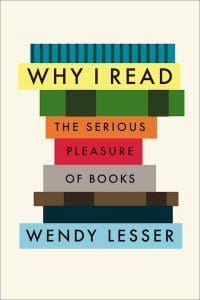 I was a bit suspicious as I approached Wendy Lesser’s Why I Read: The Serious Pleasure of Books (Farrar, Straus and Giroux; 212 pages). It’s not that Ms. Lesser—founder and editor of The Threepenny Review, author of nine previous books (including one novel, The Pagoda in the Garden), and a prolific literary critic herself—lacks the credentials to write a long, meditative study of the passion she has made her career. (Quite the contrary; I can imagine few more qualified than her.) Rather, I was worried that, by virtue of her position vis-a-vis books and the Professional Writing Life, such a study would be rendered too cloistered, too pedantic—too, in a word, unpleasurable—to appeal to anyone but those lucky enough to get paid to read. A cursory flip through the contents only added to my qualms: chapter titles such as “Novelty,” “Authority,” and “The Space Between”; paragraphs full of pithy descriptions of often unfamiliar texts. How could any of this hope to capture, much less add to the undefinable, the ineffable, the complex yet simple joy we feel when we read a good book?
I was a bit suspicious as I approached Wendy Lesser’s Why I Read: The Serious Pleasure of Books (Farrar, Straus and Giroux; 212 pages). It’s not that Ms. Lesser—founder and editor of The Threepenny Review, author of nine previous books (including one novel, The Pagoda in the Garden), and a prolific literary critic herself—lacks the credentials to write a long, meditative study of the passion she has made her career. (Quite the contrary; I can imagine few more qualified than her.) Rather, I was worried that, by virtue of her position vis-a-vis books and the Professional Writing Life, such a study would be rendered too cloistered, too pedantic—too, in a word, unpleasurable—to appeal to anyone but those lucky enough to get paid to read. A cursory flip through the contents only added to my qualms: chapter titles such as “Novelty,” “Authority,” and “The Space Between”; paragraphs full of pithy descriptions of often unfamiliar texts. How could any of this hope to capture, much less add to the undefinable, the ineffable, the complex yet simple joy we feel when we read a good book?
“It’s not a question I can completely answer,” Lesser writes, beginning her prologue as if in anticipation of my worries, inviting us into what she hopes will be a conversation between our ideas and hers: “You are my silent partner in this enterprise. As I make observations and assertions, you give your assent or withhold it, according to your own opinions. Sometimes I may persuade you, and sometimes you may resist. In either case, the conversation continues for as long as you are reading this book, and possibly after.”
It is this sense of inclusion, Lesser’s assent to the great and mysterious democratic pull of literature, as well as her unbridled enthusiasm for the written word, that fuels Why I Read. In seven loosely linked chapters that she describes as “something like a spiral, on which you and I are progressing upward (or perhaps downward) but also round and round,” Lesser explores various issues that keep her (or, alternatively, prevent her from) turning the page. Familiar topics like tension and suspense are touched upon alongside more unexpected subjects such as the merits of innovation versus tradition in literature, or how different translators can ultimately affect the final text. Throughout, Lesser peppers her discussion (er, conversation) with a wide array of examples, pulling from a lifetime’s worth of reading that is broad enough to include not just literature and prose, but also theater and poetry and genre fiction, too.
The result is invigorating. Although her tastes continually bring her back to several of her favorites (Dostoyevsky and Henry James seem to find a place in nearly every chapter), Lesser never lingers on one topic or author too long, preferring instead to jump around like an impassioned lecturer stubbornly circling her central question of why. For instance, on the issue of writerly authority, that power the author wields to convince her readers of her world, Lesser moves confidently between well-known writers such as Proust and D.H. Lawrence to more obscure authors like Alexander Herzen and Shashi Bhat. The experience can sometimes be dizzying, an effect Lesser acknowledges in her prologue. But more often it is illuminating, allowing us to form connections across books and writers we otherwise might have not.
It is to Lesser’s credit that she is able to do this while maintaining a critical voice that is both authoritative and friendly, unafraid to go against popular opinion in order to pinpoint what, for her, makes literature work. She writes of how she considers it a flaw that W. G. Sebald’s characters are all simply versions of himself, and how “a similar flaw afflicts an even greater writer, Franz Kafka, whose strongest works are almost unbearable because of the airlessness of their self-enclosure.” She calls Joyce’s Ulysses “a novel that has always gotten on my nerves,” and admits to having a profound affection for Norman Mailer’s nonfiction writing, even while finding the voice of his fiction “crude and undeveloped.”
Likewise, Lesser does not shy away from critiquing herself: “I have been making so many broad assertions that my readers may well feel their credulity exhausted,” she writes in the midst of her chapter on authority. Rather than undermine her arguments, though, such statements help draw us closer to Lesser the reader, grappling with the ultimate unknowability of what makes reading so stubbornly appealing, why it continues to endure. “It is impossible,” Lesser writes, “for any one person, or even a large collection of people, to make literary judgments that will last for all time, or even a lifetime. Knowing this, I have determined to practice to the full my right to be wrong.” It is a difficult stance to disagree with, and one that, throughout, makes her passion, her pleasure, felt.
